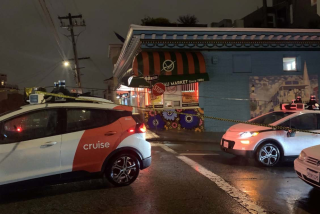Reno to Review Tire Controversy
WASHINGTON — Atty. Gen. Janet Reno threw herself into the deepening controversy over Bridgestone/Firestone’s defective tires on Thursday, saying that the Justice Department will review the matter to determine if legal action might be warranted against those deemed responsible.
“We’re reviewing everything to see what would be appropriate, and that would include civil or criminal processes,” Reno told reporters.
The Justice Department’s review--still at a very preliminary stage--comes in response to a request from Sen. Patrick J. Leahy (D-Vt.), who told Reno in a letter released Thursday that “the American public has been subjected to unnecessary risks and that criminal laws may be implicated.”
Justice Department lawyers have begun discussing the matter with officials at the National Highway Traffic Safety Administration, and the Justice Department may consider bringing a civil lawsuit--often a powerful tool for the federal government to extract financial damages from corporations--if requested by NHTSA, officials said.
Executives at Bridgestone/Firestone and Ford Motor Co. have been roundly upbraided for their failure to disclose known tire hazards linked to scores of deaths in Ford Explorers and other vehicles in the United States. Last month, Firestone voluntarily recalled 6.5 million 15-inch ATX, ATX II and Wilderness AT series tires used mainly on Ford’s Explorer sport-utility vehicle.
Investigators at NHTSA are trying to determine whether Bridgestone/Firestone or Ford violated a federal law to report product defects. The agency could impose a fine of up to $925,000 on each company.
But it remains unclear what criminal laws the Justice Department might apply to what is largely a regulatory matter. One Justice Department official said that based on the evidence that has surfaced so far, criminal charges appear unlikely.
Indeed, the whole notion of criminalizing safety defects has sounded alarm bells in the transportation industry and with regulators.
At a recent symposium in Washington, National Transportation Safety Board Chairman James Hall noted that criminalizing transportation problems could make employees less willing to expose potential hazards. As a result, he said, federal regulators must weigh the risks and rewards in asking themselves: “What crimes are accidents, and when do accidents become criminal?”
Criminal charges against corporations stemming from product defects are fairly rare.
In what is believed to be the first federal criminal prosecution in a U.S. air crash, a federal jury last year found an airline maintenance company, SabreTech, guilty of nine hazardous materials violations in the 1996 ValuJet crash in Florida that killed 110 people. But in 1980, Ford was acquitted of reckless homicide charges in an Indiana state court in a case stemming from the deaths of three teenagers in the fiery crash of a Pinto subcompact.
Despite the difficulty in prosecuting such cases, the Bridgestone/Firestone case has left consumer safety advocates and members of Congress clamoring to know whether tire and auto executives intentionally hid safety hazards and whether laws were broken as a result.
“If there is indeed evidence of a cover-up and it rises to that level, I think it’s entirely appropriate for the Justice Department to look at potential criminal charges,” said Sally Greenberg, senior product safety counsel at Consumers Union, a Washington-based public-interest group.
Meanwhile, Sen. Arlen Specter (R-Pa.) joined a growing list of lawmakers demanding reforms as a result of the Bridgestone/Firestone controversy. He introduced a bill Thursday that would impose criminal penalties for “the knowing and reckless introduction of a defective product into interstate commerce.”
Other federal legislation introduced this week would require that corporations inform U.S. regulators within two days of overseas recalls.
An official in the inspector general’s office of the Transportation Department said Thursday that the agency doesn’t “have any kind of investigation open” into the tire controversy.
More to Read
Sign up for Essential California
The most important California stories and recommendations in your inbox every morning.
You may occasionally receive promotional content from the Los Angeles Times.










